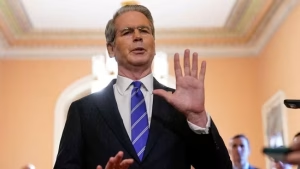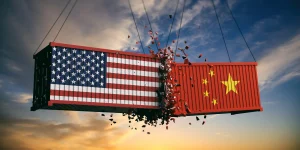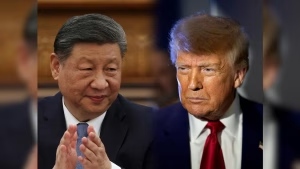Washington D.C. – Amid intensifying trade tensions, Trump China Tariff Talks have once again taken center stage in global diplomacy. China on Saturday announced its willingness to engage in a new round of discussions with the United States “as soon as possible,” following U.S. President Donald Trump’s decision to impose a 100% tariff on Chinese exports bound for America. The move, which sent shockwaves across financial markets, is being interpreted as a strategic effort by Washington to pressure Beijing back to the negotiation table.
China’s Willingness for Fresh Dialogue

According to official statements, Beijing’s top negotiator, Vice Premier He Lifeng, held a video conference with U.S. Treasury Secretary Scott Bessent, where both sides had what was described as “candid, in-depth, and constructive exchanges.” The renewed Trump China Tariff Talks are expected to focus on reducing trade imbalances, tariff structures, and addressing concerns about technology and software exports.
This development marks the first direct contact between senior officials from both countries in weeks, signaling a potential thaw in an otherwise strained relationship. For Beijing, reopening communication channels appears to be an attempt to stabilize the situation before Trump’s latest trade measures take effect on November 1.
Trump’s 100% Tariff Announcement


The Trump China Tariff Talks gained urgency after President Trump’s announcement last week that his administration would double existing tariffs to 100% on all Chinese goods headed to the U.S. This sweeping move also includes new export restrictions on “any and all critical software,” a measure scheduled for implementation just days before current tariff relief is set to expire.
The U.S. President framed the move as a necessary step to “defend American interests” and “ensure fair trade,” adding that China had benefited disproportionately from existing agreements. Trump’s rhetoric emphasized strength and decisiveness—characteristics central to his trade policy approach.
A Meeting Planned Between Trump and Xi

Adding to the momentum of the Trump China Tariff Talks, Trump confirmed that he intends to meet Chinese President Xi Jinping in two weeks in South Korea. This proposed meeting follows a period of uncertainty, as Trump had previously expressed doubts about its feasibility.
During his recent interaction with reporters, Trump spoke highly of Xi, calling him a “strong leader” and emphasizing their “mutual respect.” Analysts suggest that the personal rapport between the two leaders could serve as a stabilizing factor in the turbulent trade relationship between the world’s two largest economies.
US Treasury’s Optimistic Outlook
U.S. Treasury Secretary Scott Bessent, who has played a key role in facilitating the Trump China Tariff Talks, expressed cautious optimism following his conversation with He Lifeng. “I think that things have de-escalated,” he said, adding that the U.S. hopes China will show the same level of respect and commitment that Washington has demonstrated.
Also Read: Trump On Pakistan Afghanistan Conflict: Bold Claim of ‘Easy Solution’ Sparks Global Debate
Bessent also expressed confidence that Trump’s personal diplomacy with Xi would “get things back on a good course,” indicating the administration’s expectation that direct leader-to-leader dialogue could yield quicker results than technical negotiations alone.
China’s Calculated Response
In Beijing, officials described the Trump China Tariff Talks as necessary to prevent economic escalation. While Chinese ministries refrained from issuing strong condemnations, internal discussions reportedly emphasized the need to balance firmness with pragmatism.
China’s Vice Premier He Lifeng, who has been leading the negotiation team since 2024, is said to favor dialogue over confrontation, believing that resuming talks could help safeguard China’s economic stability amid growing international uncertainty. Beijing’s announcement to reopen talks “as soon as possible” signals a potential shift toward conciliation rather than retaliation.
Global Economic Reactions
The Trump China Tariff Talks have already influenced global markets. Following Trump’s announcement, Asian stocks experienced temporary declines, while the U.S. dollar strengthened. Economists note that a full-scale tariff implementation could disrupt global supply chains, increase production costs, and affect consumer prices worldwide.
However, the news of Beijing’s willingness to talk has since restored some investor confidence. Financial analysts suggest that if talks progress, it could avert a broader trade crisis reminiscent of the 2018 tariff standoff.
The Strategic Timing Behind Trump’s Move
Observers believe that Trump’s tough stance in the Trump China Tariff Talks serves dual purposes: exerting pressure on China and reinforcing his “America First” message domestically. With elections nearing, the 100% tariff announcement allows Trump to project an image of defending U.S. industry and technological sovereignty.
The decision to meet Xi in South Korea, just weeks after escalating tariffs, is viewed as a tactical combination of strength and diplomacy—a hallmark of Trump’s international strategy.
Prospects for Resolution
While both nations have agreed to return to the negotiating table, the success of the renewed Trump China Tariff Talks will depend on the willingness of both sides to compromise. Key areas of contention remain unresolved, including technology transfer, data security, and export regulations.
Despite the uncertainty, the dialogue itself marks a positive shift. As the world watches closely, the next few weeks could determine whether this trade confrontation moves toward reconciliation or further escalation.

